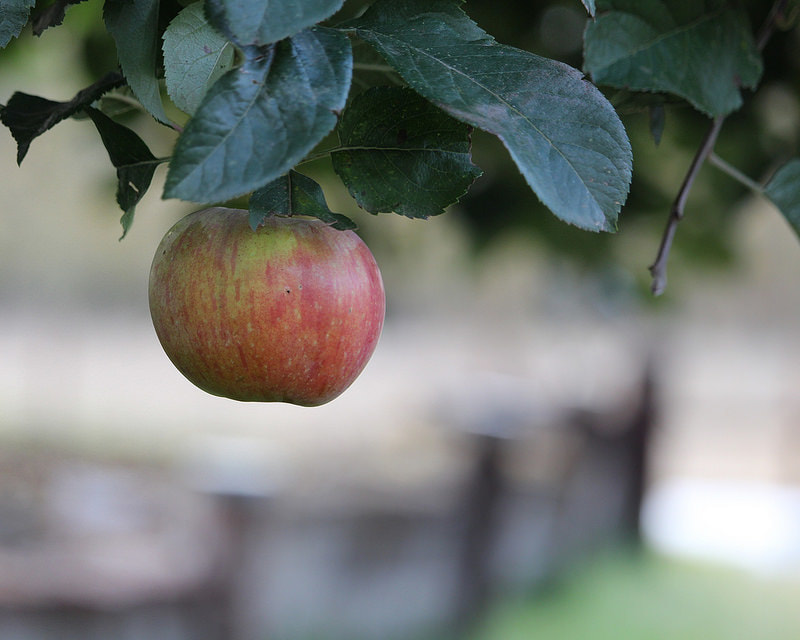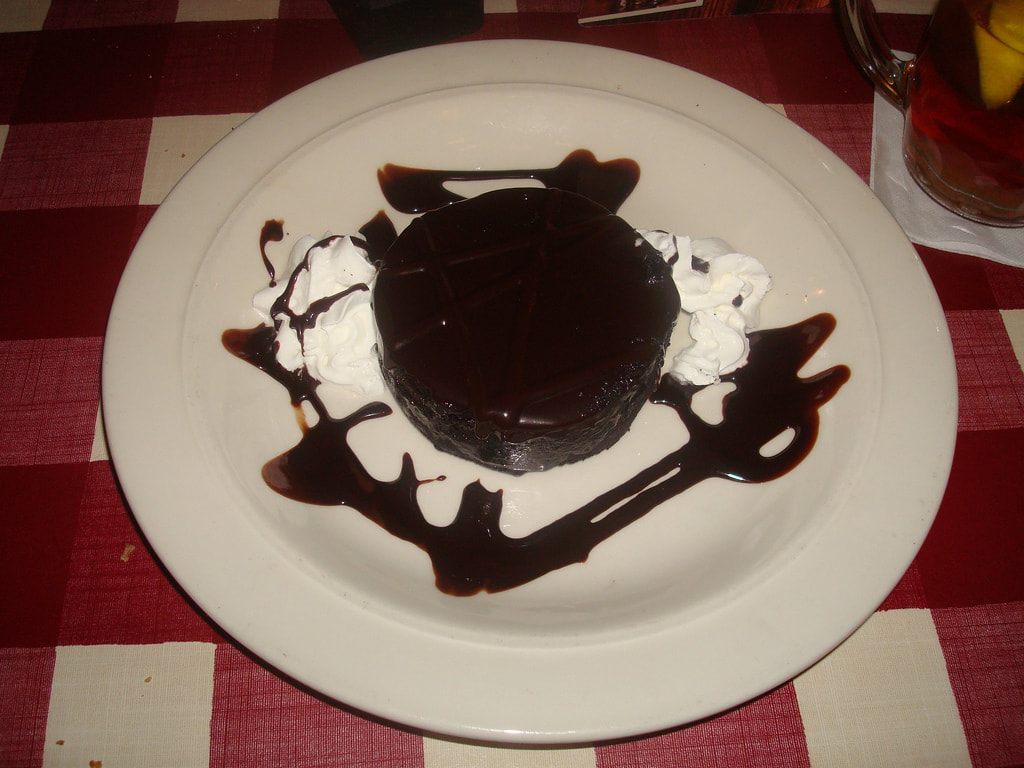Sin and Sinning
springboards for reflection
God's Enjoyment of Apples

,Joy for its own sake, laughter and conviviality without pretext, meeting time's advance with unapologetic delight, raucous noise, good friends — these are nothing less than the eruption of the hidden light cracking the conventional crust of our mature good sense, our dehumanizing obsession with control, our idolatrous reliance on possession as salvation.
Rabbi Bradley Artson, The Hidden Holiness of the Secular New Year
*
H.L. Mencken defined Puritanism as "the haunting fear that someone, somewhere, may be happy." Or having fun. Or enjoying life for its own sake.
While Puritanism may seem archaic to some, it is alive and well in many a joyless psyche. As a result many people unconsciously equate sin with pleasure, and they understandably revolt against the very word "sin" in the interests of affirming life and vitality. "Sin" gets a bad rap.
The concept of sin can be re-claimed in the 21st century only if we genuine sinners (and I am among them) recognize sin, not as rebellion against an authoritarian God by having fun; but as violence against others and ourselves, a byproduct of which may be pain in a nurturing God. Sin is a rejection of life and God's "yes" to life. Sometimes it can be a sin not to have fun. It is violence against life.
In short, we best distinguish between authentic sin (as violence) and merely apparent sin (as pleasure). And we rightly recognize that many sins of the flesh have an attractive power of their own, like the forbidden fruit in the Garden of Eden, precisely because they are condemned. They are temptations, but good ones. Holy mischievous.
When we cross boundaries in pursuit of harmless pleasures, we are seeking what God, too, loves, namely life in its fullness. We are sinning for life's sake and for God's sake. Process theology proposes that God "feels the feelings" of all living beings, all the time, sharing in their suffering and enjoying their joys. In eating the apples, God, too, gains pleasure. Yes, God enjoys a good apple, too.
Rabbi Bradley Artson, The Hidden Holiness of the Secular New Year
*
H.L. Mencken defined Puritanism as "the haunting fear that someone, somewhere, may be happy." Or having fun. Or enjoying life for its own sake.
While Puritanism may seem archaic to some, it is alive and well in many a joyless psyche. As a result many people unconsciously equate sin with pleasure, and they understandably revolt against the very word "sin" in the interests of affirming life and vitality. "Sin" gets a bad rap.
The concept of sin can be re-claimed in the 21st century only if we genuine sinners (and I am among them) recognize sin, not as rebellion against an authoritarian God by having fun; but as violence against others and ourselves, a byproduct of which may be pain in a nurturing God. Sin is a rejection of life and God's "yes" to life. Sometimes it can be a sin not to have fun. It is violence against life.
In short, we best distinguish between authentic sin (as violence) and merely apparent sin (as pleasure). And we rightly recognize that many sins of the flesh have an attractive power of their own, like the forbidden fruit in the Garden of Eden, precisely because they are condemned. They are temptations, but good ones. Holy mischievous.
When we cross boundaries in pursuit of harmless pleasures, we are seeking what God, too, loves, namely life in its fullness. We are sinning for life's sake and for God's sake. Process theology proposes that God "feels the feelings" of all living beings, all the time, sharing in their suffering and enjoying their joys. In eating the apples, God, too, gains pleasure. Yes, God enjoys a good apple, too.
|
Kinds of Sin: Bad and Good, Genuine and Counterfeit
1. Bad Sin: Missing the mark of responding to God's lure to love by intentionally harming others and oneself. Sin as doing evil. Evil as violence against creation. Presented in Johnny Cash's "I Hung My Head." 2. Radically Bad Sin: The kind of genuine sin found in scary people, such as presented by Anthony Hopkins in "Silence of the Lambs." Has a smell to it. 3. Good Sin: Harmless activities - often sexual and sensual - that are condemned by "religion." These sins often function in human life as the "forbidden sacred." Critiqued and lamented in "I Have Forgiven Jesus" by Marrissa. Silly sins are really good, not evil. 4. Sinny Sin Sins: Counterfeit sins which, when presented by clergy, evoke emotions of silly sinniness. Listen to Sinny Sin Sins by Roots Manuva (below). 5. The Forbidden Sacred: the idea of the sacred as a space or place or experience that has a special attraction to it, precisely because it is forbidden by society, which constructs a socially sanctioned sacred which is the obverse of the forbidden sacred. Popular culture is a foray into the forbidden sacred. It is "Sympathy for the Devil." 6. Religion and Nationalism as Bad Sin: the infliction of harm on others and oneself as guided by socially constructed ideals proffered by religion and nationalism 7. The Future of Sin: The concept of sin is evolving. What may seem sinful in one generation may not be sinful in the next; and the roots of sin may change as well. See BBC Radio 4 discussion, offered below. |
Authoritarian Religion and Nationalism as Bad Sin
This phenomenon of doing evil with a clear conscience in accordance with the highest ideals of the group whose opinions one respects is not a new one. Christian history is full of it. The Crusades are a commonly cited example. Those who killed witches and tortured heretics, at least in some cases, believed they were doing right. Hundreds of millions of children over centuries were taught by conscientious adults to regard their sexual desires as dirty and sinful. Gays and lesbians still suffer at the hands of righteous Christians.
Religious traditions are by no means the only ones responsible for such horrors. Nationalism has caused millions of people to kill each other. A young man is expected to be prepared to give his life for his country in the process of trying to kill other young men who are giving their lives for their countries. All are celebrated for their heroism and virtue. No doubt many of these young men have felt some pull toward recognition of the humanity of those they were fighting, and thus some doubt about the virtue of killing them. But usually this has been drowned out by the demand for total devotion to one's own nation. Almost certainly, more evil has been done by persons who think they are doing good than by those who set out intentionally to do evil. (John Cobb)
The Future of Sin
"Will sin disappear in future, as technology and a better understanding of human behaviour allow us to stop people from sinning before they act? And if sin does disappear, what would the consequences be? FutureProofing presenters Timandra Harkness and Leo Johnson find out how technology is changing our understanding of morality, and how social changes may create the circumstances for radically different moral values in future." (Radio 4, BBC, 5/5/2018)
Sin in Popular Music
Sinny Sin SinsSin sinners, I got to talk to you about your sins
Sins on street corners, Sins in your shops Sinny Sin Sins in your streets of yours Sins in your eyes, sins gonna make you cry Oh Lord, can you help me with my sins? Oh Lord can you help me with my sin sin sinners? There are no Sins like sins. I was raised in a pentecostal Church of God My father was the deacon, he used to stand preaching I used to to steal collection, I used to catch a beating Forgive me Lord, I knew not what I did I was just a kid, trying to hustle up a quid Feeling kinda ashamed, riding in the Church right Bible in my hand, dressed in my sunday best. Reach a Churchyard and I'm feeling depressed I'm in the midst of the well-dressed, talking 'bout singing, singing thanks and praise to the king of the Jews And I'm all confused, 'cos I can't see the sense Why should I turn the other cheek and get beat? Ain't no peace without war so who am I? The faster drives benz, got me looking to the sky singing soon, very soon, we gonna see the king Soon oh, very soon, we all gonna be blamed. Oh Lord can you help me with my sin sin sinners? There are no Sins like sins. Woke up one Sunday, feeling kinda raw I said "Dad, I don't really want to go Church no more" Soon as I said shit, I felt a slap to my jaw He said "Son, as long as your living under my roof Your gonna heed my interpretation of the truth And the truth is right here It's written in this book the Holy Bible It's the key to survival so you best heed the word" He said, "Do as I say, not what I do And you'll see, goodness will follow you" begrudgingly, I ironed my shirt, polish my shoes Went to Chruch and I took in their far-out views with their strange perceptions of Heaven and Hell. To this very day I still fight down their spell 'Cos all that we pray, we still stay poor With that leaky roof dripping on the front room floor. Sins gonna make you cry Oh Lord, can you help me with my sins? Oh Lord can you help me with my sin sin sinners? There are no Sins like sins. Please don't get me twisted, I'm far from a heathen This is just a simple song of basic rhyme and reason It's not my meaning to demean or blaspheme But most things in the Bible ain't as plain as they seem Can I trust King James to translate these papers? Do I need a middle-man to link with the creator Amazing grace, how sweet the sound Church band plays, now I'm spending my pound Looking for a short-cut to the road to Zion We can't fool God, but we wasting time trying Two third of the truth is yet to be told Two thousand years of corruption soon unfold Sins in your eyes, sins gonna make you cry Oh Lord, can you help me with my sins? Oh Lord can you help me with my sin sin sinners? There are no Sins like sins |
A Song about Genuine SinSongs about Counterfeit Sin |
Process Theology on Sin:
A Reflection by John Cobb
Question:
Traditional theology ascribes sin to a fall from a previously perfect state. Scientific evolutionary theory suggests rather a struggle from an imperfect prehuman but perhaps innocent state towards a more ethically aware and responsible state. The end result is the same; imperfect and fallible beings doing their best in a complex world. As I understand it process theology sees God as experiencing and luring evolving humankind towards the higher state, but scientific materialism sees no purpose in evolution. The process view seems attractive to me as a scientist who experiences God in a way that is somehow beyond the limitations of rational thought. Can you explain how process theology deals with the idea and origin of sin, and the apparent absence of any purpose in evolution?
Publication Month:
October 2001
Dr. Cobb's Response
This is an excellent question especially in the aftermath of the attacks on the World Trade Center and the Pentagon. All of us agree that the killing of masses of people who have done nothing to deserve death is a terrible evil. Many go on to call the perpetration of this evil a sin. Although "sin" is a theological, rather than a philosophical, term, it is an appropriate term for process thinkers generally to use -- and certainly for process theologians. Nevertheless, it needs to be used carefully.
In the New Testament, the Greek word translated as "sin" is "harmartia," which means "missing the mark." Whitehead describes every occasion as having an initial aim, often missed in the final form of the subjective aim. This missing is more characteristic of complex occasions such as moments of human experience than elementary ones. Hence, the role of sin is primarily in human events, and even among those, more in those of adults than in those of children. We may judge that it has become greater as society has become more complicated and shaped experience in more complex ways. The question suggests this.
Why do we so often miss the mark? In general terms, this is because every occasion of human experience is influenced not only by God's lure but by many other factors. Among these, one's personal past plays a large role. The divine lure is in the direction of taking more account of others. The pressure of the past tends to concentrate attention on one's private future. The divine lure calls for that response, often in tension with established habits, which is best in the new situation. Established habits work against the needed change.
Emotion is another important factor. When we are bullied or attacked, we feel anger. We have had a national experience of such anger recently. This is a natural and healthy feeling that may help us to deal with our situation. But it often expresses itself in actions that our own principles and beliefs do not support. Certainly, it may blind us to the divine impulse within us.
There are other tensions. Our ideals are shaped by particular traditions. Our teachers and ministers, and especially our parents, instill these ideals in us. These ideals usually pull us beyond ourselves, but they frequently call us to devote ourselves to one tribe, one community, one religious tradition, one nation, even at the expense of others. The divine call would expand our horizons still further, but social expectations and pressures work against a full response. Thus our sincere beliefs, often our religious beliefs, resist the call of God. We are persuaded by the ideals into which we have been socialized that we ought to act in ways that in fact, at a deeper level, are in tension with God's purposes for us.
Today, it is especially important to recognize that much evil is done in obedience to sincerely held convictions. In all likelihood, this is the case with those who flew planes into the World Trade Towers. They genuinely believed that this was a virtuous action. A process theologian will be convinced that, at a deep level, these persons also experienced a call to spare the lives of innocent people. But in their conscious experience, I suspect, this voice was drowned out by the assurance of their friends and associates that they were doing God's will.
This phenomenon of doing evil with a clear conscience in accordance with the highest ideals of the group whose opinions one respects is not a new one. Christian history is full of it. The Crusades are a commonly cited example. Those who killed witches and tortured heretics, at least in some cases, believed they were doing right. Hundreds of millions of children over centuries were taught by conscientious adults to regard their sexual desires as dirty and sinful. Gays and lesbians still suffer at the hands of righteous Christians.
Religious traditions are by no means the only ones responsible for such horrors. Nationalism has caused millions of people to kill each other. A young man is expected to be prepared to give his life for his country in the process of trying to kill other young men who are giving their lives for their countries. All are celebrated for their heroism and virtue. No doubt many of these young men have felt some pull toward recognition of the humanity of those they were fighting, and thus some doubt about the virtue of killing them. But usually this has been drowned out by the demand for total devotion to one's own nation. Almost certainly, more evil has been done by persons who think they are doing good than by those who set out intentionally to do evil.
Of course, this does not mean that conventional morality is always at odds with God's purposes. Sometimes it embodies hard-won wisdom that helps children discern what is truly good. But the good is often the greatest enemy of the best. And intense commitment to the established good often blocks God's call to broader horizons and adventurous novelty. With these comments in mind, I'll go back to the question of the origins of sin. No doubt there has been some missing of the mark since life began, perhaps even before. But sin implies a kind of responsibility we do not impute to actions apart from the emergence of consciousness and even of self-consciousness. Primal peoples were no doubt aware of missing he mark, although the focus was more on the objective damaging of relations than on the subjective state of individual persons, which is the proper locus of sin.
The Bible associates the emergence of sin with the movement from a gathering society (the Garden of Eden) to the domestication of plants and animals. There is little doubt that this domestication required a domestication of human beings also, which introduced new tensions into personal life. It created types of property for which there was competition, and therefore violent struggle, and it turned many human beings into property as well. Much of the evil in human relations began with this fateful change. Even so, these ancient ancestors thought more of objective evil than of subjective sin.
It was in the first century BCE, during what Karl Jaspers has taught us to call the axial period, that individuals in a number of civilizations became fully aware of themselves in their subjectivity and inwardness. At this point there was heightened awareness of the unsatisfactory nature of this internal condition and of personal behavior that was undesirable. In most cultures the explanation of this wrong behavior was ignorance. In Israel, on the other hand, the focus of attention on God's will led individuals to recognize that they often disobey when they could do otherwise. In this context, the idea of sin became important. Once it arose, it could be read back into the behavior of those who had acted without this particular form of consciousness. It could also be increasingly subjectivized, so that, by the time of Jesus, the emphasis could fall on feelings and attitudes and desires, even when they were not acted on.
To a large extent, from a process point of view, the "mark" is broadening the horizons of concern, in biblical terms, loving more neighbors more nearly as one loves oneself. Missing the mark, therefore, has to do with keeping the circle of concern narrow. It would be going too far to say that if people always widened the circle, conflict and evil would be avoided. The greatest widening that is possible in most concrete situations would fall far short of the universal concern of God. It would still leave open the conflict of one group with others. Greater intensity of concern for one's own family and community is healthy and necessary as well as dangerous and destructive. The ideal of a world in which we loved all neighbors as ourselves remains a very distant lure!
The questioner suggests that the scientific view is that our task is to outgrow our primitive heritage. No doubt there is some truth to this. But it could be understood to mean that the process of civilization has made us less sinful. This is extremely doubtful. Our primitive heritage certainly limited horizons of concern, largely to the tribe and its immediate environment; and as time has gone on, the importance of extending concern more widely has greatly increased. Our heritage from our past may be one of the obstacles to doing so. But much that has developed in subsequent times has been designed to focus concern and loyalty on narrow goals. Even our religious communities are often guilty of this. And as noted above, civilization brought into being many of the destructive tensions that have heightened the problem of sin. It is better to focus on our society than on our genes as we seek to understand sin and reduce its power in the world.
Finally, although process theology has a definite and important place for sin as voluntary failure to fulfill the call of God, we need also to recognize that, like so many concepts, an emphasis on sin can do, and has done, great harm. Much of the explanation of many objectively evil acts is to be found in social and personal circumstances over which the actor had no control. Quickly labeling the actor as "sinner" has led to forms of treatment that do not express the understanding and love to which we are called. This labeling may be a greater sin that the original act.
When sin is identified with violation of God's will, and that will is understood to be embodied in a set of rules, the legalism that results can be very destructive indeed. We are encouraged to silence God's call instead of developing sensitivity to it. Of course, most violation of the rules is not out of sensitivity to God's purposes, and much of it expresses sin as well as uncontrollable conditions. But no set of rules can be more than a very general indication of the typical nature of God's call, and many such sets include social prejudices that have nothing to do with that call. This has been especially true in the area of sexuality, but the problem is by no means limited to that. The New Testament tries to free us from this close association of sin with obedience to law, but unfortunately Christians fall back into this legalism again and again.
Radically Bad Sin in Film
|
|
|
Sympathy for the Devil:
The Forbidden Sacred
"While religion in the West no longer enjoys the position it used to in society, nevertheless, because of a vestigial Christian hegemony, which informs the dominant moral value system enshrined in state legislation, and because of conservative Christianity’s periodic vitriolic resistance to what it considers profane, the Church has managed to hang on to its place of honor in popular music culture as a focus for ridicule and parody." (Christopher Partridge)









